|
WiRED Opens New CHI Center e-Libraries on Two Continents
BY KRISTEN GARABEDIAN; EDITED BY BERNICE BORN
T
hree new Community Health Information (CHI) centers are now up and running in Quilalí and Chinandega, Nicaragua, and Marcovia, Honduras. Upgraded CHI libraries are also installed in Kisumu, Kenya. In September 2012 WiRED Director Gary Selnow traveled to Central America then Africa to expand delivery of our new and growing CHI e-libraries, which provide cutting-edge training materials that cover more than 160 critical health topics for developing and war-affected regions worldwide.
Dr. Selnow worked with local managers in Nicaragua, Honduras, and Kenya to install these new CHI centers and trained local hospital staff to access WiRED's medical and health education materials. In addition to the three new CHI centers in Central America, WiRED installed new CHI libraries in two existing facilities in Pandipieri and Obunga, Kenya.
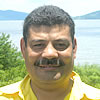 Santiago Castellon
Santiago CastellonAs one of the poorest countries in Latin America, with high maternal, infant, and children-under-five mortality rates, Nicaragua is in critical need of reliable health information. In Nicaragua, Dr. Selnow worked with WiRED's regional manager, Santiago Castellon, to set up computers in each CHI facility there. As the team left the hospital in Quilalí, Nicaragua, they saw the training nurse going through the infant nutrition module with four pregnant women.
Quilalí also had a dengue fever outbreak at the time, and people were immediately drawn to WiRED's module on that disease. Most people there have no idea what dengue fever is, although they know it is transmitted by mosquitoes. WiRED's dengue fever module is aimed at grassroots audiences and provides complete information on how to prevent, diagnose, treat, and care for someone with this life-threatening illness.
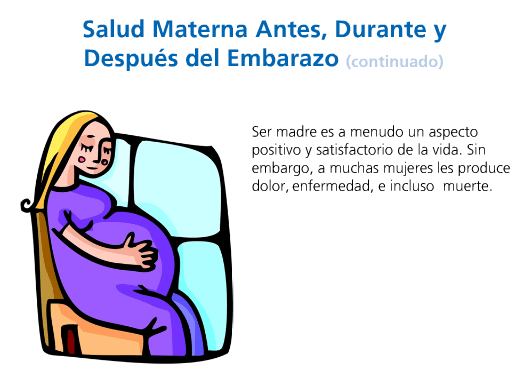 From WiRED's CHI training module on Maternal Health.
From WiRED's CHI training module on Maternal Health.From Nicaragua, the WiRED volunteers traveled to Honduras, where more than half of the population lives at or below the country's poverty line. With a direct correlation between income levels and access to quality health care, and with an estimated 57 doctors per 100,000 people, the rural and urban poor in Honduras are in great need of accurate medical information.
Mayor Calix Naún Jose Alvarez officiated at the ribbon cutting for WiRED's new CHI center in Marcovia, Honduras. "I am extremely grateful to WiRED International for this valuable project," said Mayor Alvarez. "This will greatly strengthen the health of our community. Through these excellent tools, our people will be able to inform themselves about medical issues and diseases and understand how to take care of their health."
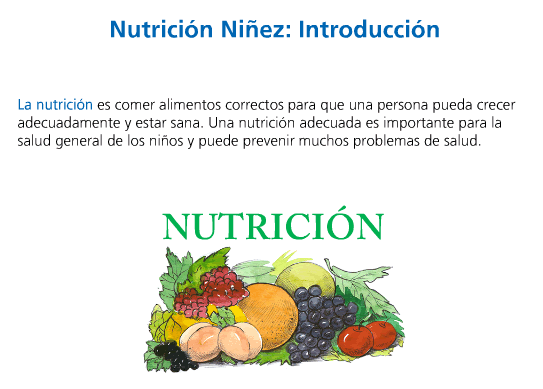 From WiRED's CHI training module on Childhood Nutrition.
From WiRED's CHI training module on Childhood Nutrition.Jose Fernando Nuñez Pavón, a second year student at Marcos Aurelio Soto, added: "I am very anxious to learn these modules, which will be of great benefit to me and to my classmates, and to learn to put into practice all the tactics necessary to prevent disease and apply good hygiene in our daily life. I am proud that WiRED International has chosen our community to benefit from this virtual library project."
Many people in Honduras do not have access to running water and sanitation facilities, and widespread malnutrition accounts for about 30 percent of children under age five experiencing stunted growth. To help fight these and other factors contributing to the country's high infant mortality rate and relatively low life expectancy overall, WiRED's e-libraries offer modules on maternal and child health, good nutrition, water filtration, and sanitation and hygiene practices.
José Santos Maradiaga, who works as an assistant in the Environmental Area in Marcovia, said of WiRED's new CHI center, "I greatly appreciate WiRED International for benefiting our community in this way with computers and these excellent health care modules... I believe this will create a total change in our lives, both in the community and for our employees, as they practice improved hygiene and learn to avoid diseases that occur here daily."
Miriam Cruz, secretary to the mayor, added: "Actually, I never had so much information about hygiene and how to avoid diseases. I think it is an excellent project and I will promote WiRED International in our community. I will try to check each item step by step so I can learn more and also invite many people to join this program, so we can live in a community that is cleaner and healthier. I am a person with health problems, so I think this will help me take better care of my health and my life."
WiRED's e-libraries also educate people about prevention and treatment of parasitic and infectious diseases, which are leading causes of death in Honduras. "I am very sorry to say that I never had this knowledge before in my life," said Amador Neptali Arriola, assistant to the mayor in Marcovia Center. "I think it is very important that WiRED International came to our community. Now with these teams and this health program, we will raise awareness about the importance of good health and avoiding diseases."
Due to limited preventive measures in Honduras, infectious diseases such as malaria, typhoid, tuberculosis, cholera, HIV/AIDS, and pneumonia can spread quickly and pose a serious risk to the population. The kind of reliable medical and health information provided in WiRED's e-libraries is key to improving this situation. "With this new opportunity to learn to be more aware of the importance of health and how to avoid diseases, this project will be life changing for me," said Martinez Alvarado Olibeth Ritza, a homemaker from Marcovia Center. "I will recommend that all my family attend the WiRED CHI center so we can learn from these modules and put the information into practice."
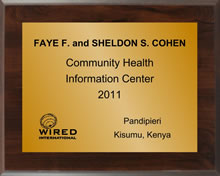 A week after returning to the United States from Central America, Dr. Selnow traveled to Kisimu, Kenya, to deliver the latest version of the CHI e-library. WiRED has worked for 10 years in Pandipieri, bringing health information to the community through a health facility for AIDS and general care, orphan schooling, and more. Our CHI center, now called the Faye and Sheldon Cohen Center for Community Health Education (referred to locally as the "Cohen Center"), provides all community members with free access to health information.
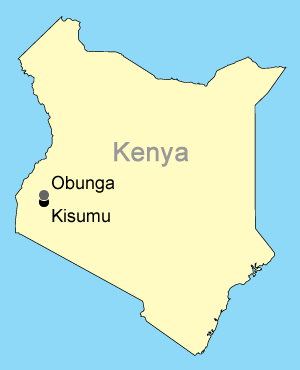 WiRED has also been working for the last three years in a second CHI center in Kenya. Located in a youth center in Obunga, in a large slum in Kisumu, this CHI center primarily serves street kids and other youth by providing critical HIV/AIDS information. It also offers general health education to the greater community. This center is supported by Eric Lumley from the United Kingdom. Dr. Selnow brought WiRED's new e-library of more than 160 medical and health education topics to this CHI center in Obunga, and a Kisumu technician, Michael Okoth Oloo, who maintains our computers, installed the programs. People eagerly went through WiRED's new programs to see what we have added and updated.
Each year, CHI staff members on the ground suggest new topics and updates for the CHI libraries. Dr. Selnow said: "I had a number of meetings with staffers and discussed a dozen new topics for which they need modules and information. One is how to tell a child who has arrived at the age of understanding that s/he has AIDS, what that means, and how to deal with the illness. Most of these children are orphans, so the sad task falls to people other than parents. People who take on this assignment are looking for a way to do it effectively and with minimal injury to the child. WiRED is talking with psychologists about the issue and will create a module to train adults."
At WiRED's new CHI e-library in Kisumu, community members can also earn health education certificates through a special program that encourages people to study a given module and, when ready, to take a test on the material. While many people are already motivated to visit the CHI center to learn about prevention or a specific illness, this certificate program provides them with an extra incentive to educate themselves about a wide variety of health issues. Certificates are not offered as accreditation; their purpose is to recognize accomplishment and successful completion of WiRED training programs.
"WiRED charges nothing for our materials; our goal is to make this medical and health information as widely available as possible to the people who need it most."
—Sr. Bernadette Healon
In the Central American communities where WiRED has installed these new CHI centers, doctors and nurses talked most about dengue fever, malaria, maternal care, and child nutrition issues. The top 10 most popular topics in our Kisumu, Kenya, CHI centers are HIV/AIDS (and daily living with HIV/AIDS), HIV basic information for adults and teens, water and health, sexually transmitted diseases, malaria, a healthy diet for nursing mothers, a women's health series, alcohol and substance abuse, hand washing, and dental problems.
Sister Bernadette Healon, who is in charge of both Kisumu facilities, praises the work of WiRED: "WiRED funds both CHI facilities in Kenya with donations from individuals, and we pay stipends to five local people to operate these centers. WiRED charges nothing for our materials; our goal is to make this medical and health information as widely available as possible to the people who need it most."
^ Back to the Top
|



